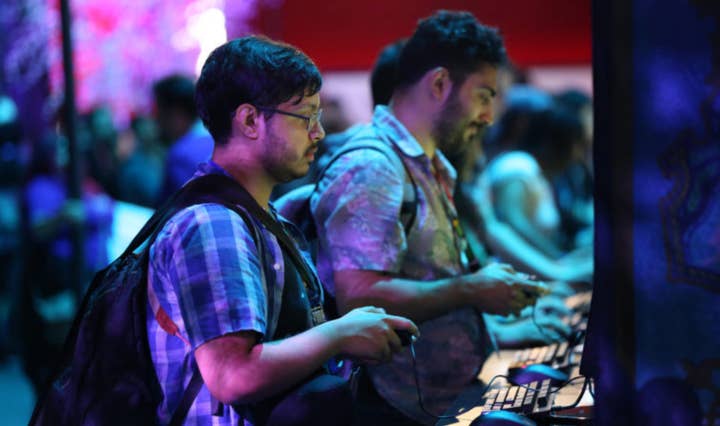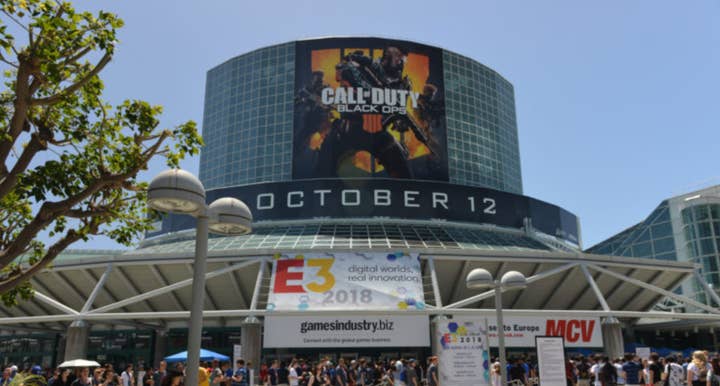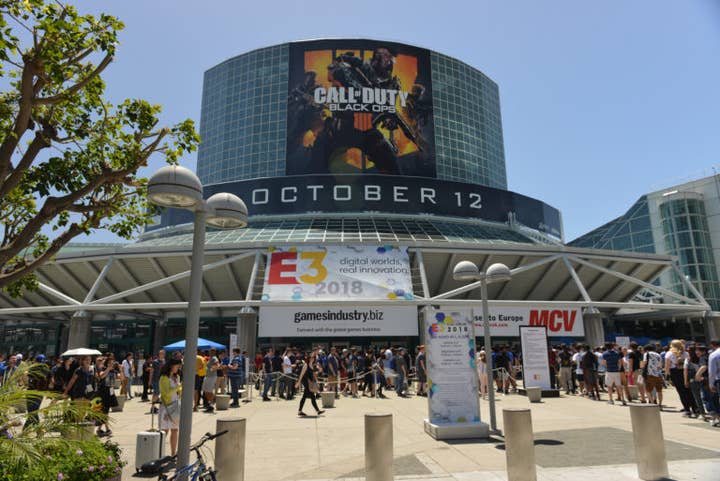I really want E3 back | Opinion
There are clear benefits to spreading out announcements during the summer, but there's more to it than just better numbers
Earlier this week, analytics firm Fancensus argued that we don't need E3 anymore.
It used those pesky facts to make a case. The data states that the big game reveals of the last few months have generated more noise, attention and coverage compared with the big announcements of E3 last year.
There are a few caveats to consider. Almost everything is up in the online world this year; more people are reading stories, more people are watching videos, and more people are on social media, which is unsurprising when you consider the number of people who have been stuck at home. We -- as in GamesIndustry.biz -- have broken our monthly traffic record three times since lockdown started, and that's a trend across the games media. If you're creating interesting, insightful content, the COVID-19 situation has provided you with a captive audience. Couple that with the pent-up demand for new game announcements, particularly from Sony, and it's no surprise that records are being broken.
Therefore, comparisons between 2020 and 2019 are not entirely like-for-like. Even so, Fancensus' point still stands: the game reveals of 2020 are generating more buzz than the reveals of 2019. So do we really need E3? Do we need physical events at all?
This year's series of digital events have been prolonged, messy, complicated and inconsistent
Yes. Yes we do. Numbers be damned. This year's series of digital events have been prolonged, messy, complicated and inconsistent, scattered among different schedules, media outlets and, well, Geoff Keighley. Publishers, developers and platform holders are tasked with keeping all of their big digital partners happy, which means it's been almost impossible to keep track of it all. There's no single online equivalent to the Los Angeles Convention Center. There are dozens of them.
This is nobody's fault. Everyone is doing the best they can in an impossible situation. The pandemic is what killed E3 this year, and it's the pandemic that has messed up development schedules, making announcements tricky to judge and pull together. But the absence of E3 in 2020, far from proving that we don't need the show, has actually done the opposite.
Digital events don't compare with physical ones, particularly in video games where the artform is meant to be played. I'm not specifically talking about press conferences here, although some of the reveals we've seen -- such as Fable and Horizon: Forbidden West -- would have no doubt received a rapturous response in front of a live audience.
Instead, I am talking about the ability to go beyond the trailer, to ask questions of the creators and experience the products. During the Xbox event last week, the gameplay reveal of Halo: Infinite was less than ideal. It looked exactly like the sort of game a Halo fan would want, but it came under fire for its lack of visual flair. I've been told that it is a fantastic experience with a pad in your hand, but there was nobody to make that argument last week. The headlines were all "What's wrong with Halo's graphics?" And not "Halo may not look like much, but it's a joy to play."

Even the PS5 reveal, which was mostly well received, suffered some mild criticism for the fact the games didn't look especially different to the ones on PS4. But it's hard to sell the speed of the SSD over a pre-recorded video. Is the DualSense controller really all that? Geoff Keighley seemed to like it, but what about everyone else? The lack of E3 robs us of this analysis. E3 was never just about the number of viewers; it's about those hands-on reports, those side-by-side comparisons, and those "Best of E3" lists.
Those lists are one of the advantages, at least from a consumer perspective, behind announcing products close together. A show like E3 paints a full picture, in terms of console games, of what's coming up. After PlayStation revealed PS5 in June, I was still unaware of what the big games coming to that platform would be. At that point, we'd barely seen anything from EA, Activision or Ubisoft. We also had only a loose idea over what its main competitor would be doing.
This lack of visibility is far from ideal. There's no single place where everything is rounded up so that fans can form their wishlists or get those pre-orders in. It's practically August, and we still don't have a full view over what's coming this Christmas. Where is Call of Duty? Did someone forget to remind Nintendo to announce something? The situation is also proving to be a headache for retailers, at a time when they could do with some clarity.

You don't need E3 to do this, of course. E3 isn't really a single event -- it's a collection of individual publisher shows that come together at the same time, with an expo floor in the middle (which some do not attend). What if instead of E3, these individual publisher shows are just scattered over a month, some digital and some physical. Everything still happens within a relatively short space of time, but publishers get that benefit of a clear window in which to show their games.
The absence of E3 this year, of that bonkers, exciting week in the middle of June, has been felt
This would also benefit the media. One of the clear advantages we've had during COVID-19 has been the chance to digest the news, spend longer with interview subjects, and take our time over the coverage. We've done pieces this year that wouldn't have been possible condensed into a single week.
This is what Fancensus was suggesting in its analysis. Granted, there are practical advantages to doing everything in one place like E3. It's easier to convince business partners and media to come to one event than it is three or four -- people do need to be at their desks at some point, and there are carbon footprints to think about. Also, one big event allows slightly smaller publishers, like Square Enix and Bethesda, to do their own reveal shows, which perhaps wouldn't be viable without an E3 to bring in the people -- something noted by SuperData.
Nevertheless, there is logic to spreading things out a bit, and Fancensus has the data to prove it. But it's not always about what makes logical sense. E3 is often called "Christmas for gamers," and I think that makes for an interesting comparison. Imagine if Christmas wasn't just a few days towards the end of December, but instead you were given a present every two weeks over a prolonged period. That would certainly make more sense as you would have the time and space to properly enjoy the present. Logically, a Christmas spread out over three months would create far better results than a Christmas condensed to just a few days. But it also wouldn't be nearly as exciting or fun. It wouldn't bring people together the way it does right now.
That sort of sentimental perspective is subjective and intangible. You can't easily put the words "more exciting" into your ROI column on your marketing budget sheet. But the absence of E3 this year -- of that bonkers, exciting week in the middle of June -- has been felt. Our sister site Nintendolife recently did a poll of its audience -- Nintendo fans are probably the most disappointed by this summer so far -- and asked them if they've missed the focus of E3, and 74% said yes. When asked if there's an opportunity for E3 to return with a bang next year, 56% said "yes, this year shows we still need E3" and 25% said that it could do "as long as there are some tweaks."
Fancensus argued on Wednesday that we don't need E3, and it's right -- we don't, and we never did. But I like to think that once the dust has settled on this unusual, confusing summer, we will want it back.

